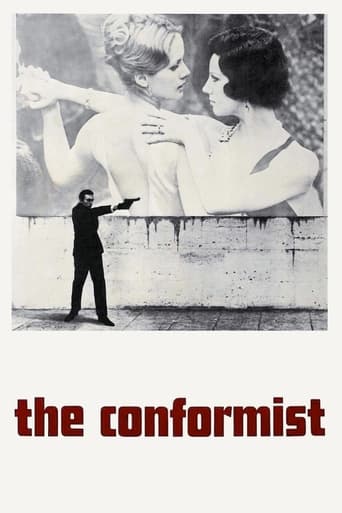A dazzling movie.
"Il conformista" (1970), a cinematic masterpiece directed by Bernardo Bertolucci, is a profound exploration of fascism, identity, and conformity set against the backdrop of 1930s Italy. Produced by Marianne Productions and Maran Film in a collaboration between Germany and France, the film delves into the life of Marcello Clerici, portrayed with chilling precision by Jean-Louis Trintignant. Marcello, a man haunted by his past and desperate to fit into the fascist regime, embarks on a mission to assassinate his former professor, now an anti-fascist living in Paris. The film's lush visuals and meticulous attention to detail create an atmosphere that is both beautiful and unsettling, reflecting the internal conflict of its protagonist. The narrative of "Il conformista" is as much about Marcello's personal journey as it is a critique of the fascist ideology that pervades his world. Bertolucci masterfully uses the film's setting to underscore the themes of conformity and repression. From the stark, oppressive architecture of Mussolini's Rome to the more liberated, yet ultimately dangerous, streets of Paris, the film's environments serve as a constant reminder of the forces shaping Marcello's life. The film's use of color and shadow further enhances its thematic depth, with the vibrant hues of Italy contrasting sharply with the darker tones of Marcello's inner turmoil. One of the most striking aspects of "Il conformista" is its exploration of sexuality and identity. Marcello's repressed homosexual desires and traumatic childhood experiences drive his need to conform, making him a willing participant in the fascist machine. The film does not shy away from depicting the psychological toll of living under such a regime, and it is through Marcello's interactions with his wife, Giulia, and his professor's wife, Anna, that we see the human cost of his choices. The performances of Stefania Sandrelli and Dominique Sanda as Giulia and Anna, respectively, add layers of complexity to the narrative, highlighting the film's nuanced portrayal of gender and power dynamics. Ultimately, "Il conformista" stands as a timeless critique of the dangers of conformity and the moral compromises individuals make to belong. Bertolucci's direction, combined with the film's stunning cinematography by Vittorio Storaro, creates a visual and emotional experience that resonates long after the credits roll. The film's relevance endures, serving as a poignant reminder of the fragility of personal and political freedom in the face of oppressive regimes. "Il conformista" is not just a film about a man's struggle to fit in; it is a powerful statement on the human condition and the lengths to which we will go to avoid standing out.
Năm:1971
Ngân sách750000$
Thời lượng108 phút
Doanh thu233493$
Thể loạiPhim Chính Kịch
Các quốc gia sản xuấtGermanyFranceItaly


